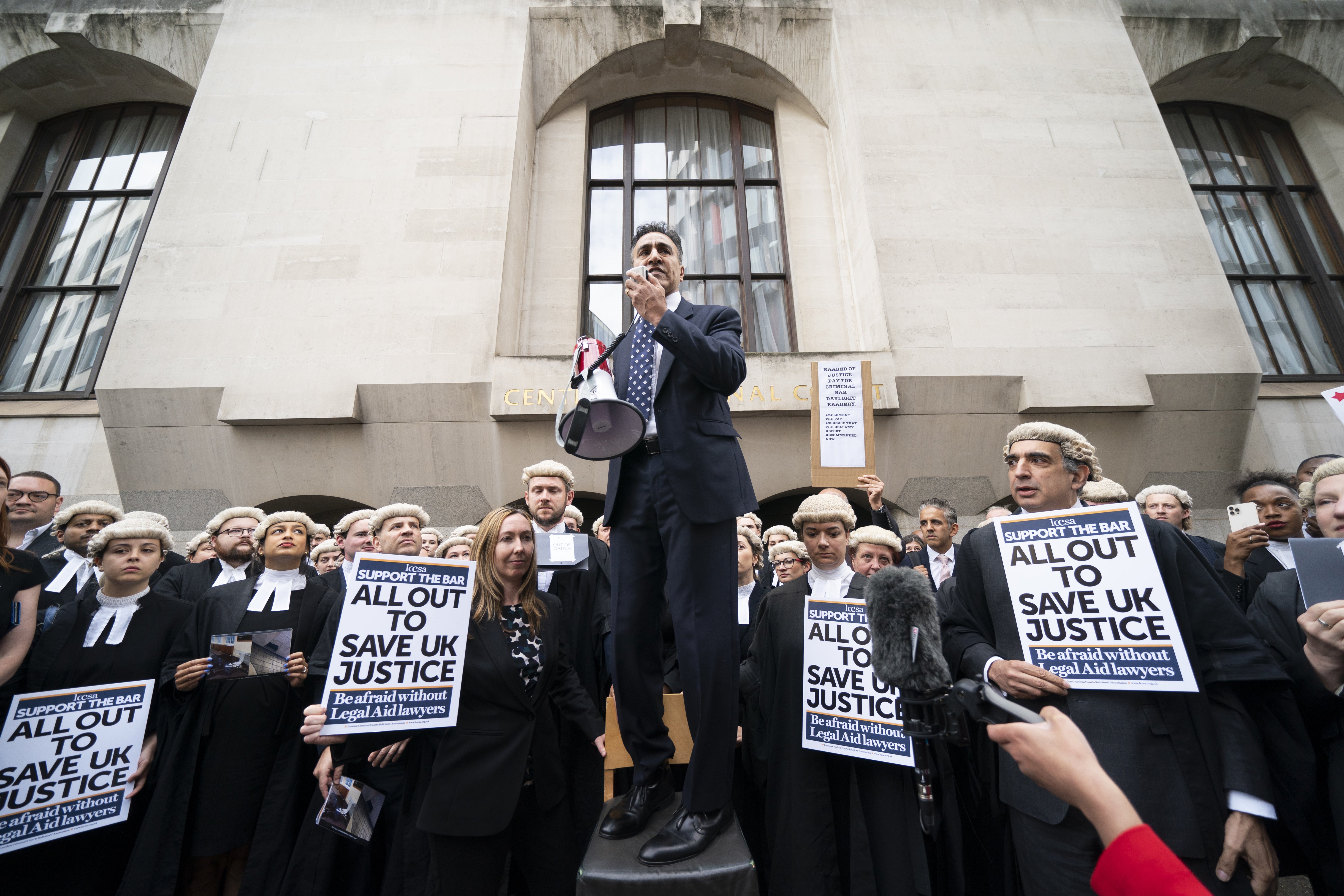Fresh court delays as barristers walk out on first day of strike action
Criminal lawyers have taken industrial action in a dispute over pay and conditions.

Your support helps us to tell the story
From reproductive rights to climate change to Big Tech, The Independent is on the ground when the story is developing. Whether it's investigating the financials of Elon Musk's pro-Trump PAC or producing our latest documentary, 'The A Word', which shines a light on the American women fighting for reproductive rights, we know how important it is to parse out the facts from the messaging.
At such a critical moment in US history, we need reporters on the ground. Your donation allows us to keep sending journalists to speak to both sides of the story.
The Independent is trusted by Americans across the entire political spectrum. And unlike many other quality news outlets, we choose not to lock Americans out of our reporting and analysis with paywalls. We believe quality journalism should be available to everyone, paid for by those who can afford it.
Your support makes all the difference.Barristers in England and Wales have begun strike action in a dispute over pay and conditions.
Some crown courts across the two nations are running limited services, with criminal trials and other cases postponed or rescheduled from Monday, the first day of a walkout by thousands of lawyers.
Barristers on picket lines accused the Government of not listening to their concerns about the criminal justice system, and are angry that a proposed pay rise of 15% would not kick in immediately or apply to backlogged cases.
Justice Secretary Dominic Raab said the barrister strikes are “regrettable” and will “only delay justice for victims” at a time when pressures on the criminal justice system have resulted in significant waiting times for cases to be concluded.
Monday’s walkout – the first of 14 days’ action planned for the next four weeks – meant that some courtrooms sat empty, while others were only able to swear juries in before adjourning cases until later in the week, when lawyers are available.
Kirsty Brimelow, vice chairwoman of the Criminal Bar Association (CBA), which represents barristers in England and Wales, said from outside Manchester Crown Court: “The Criminal Bar Association has repeatedly warned the Government that the huge decline in real incomes at the criminal bar poses the most serious threat to the British legal system in decades.
“We have made our case over and over again to Government but our warnings continue to fall on deaf ears.
“They have no solution to saving the criminal justice system. This is a national crisis which is of Government making and it must be dealt with as a national emergency.
“We cannot allow further attacks on our profession when we know the reality of the crumbling courts and junior barristers, who walked away long before this action.
“We take this action in the name of citizens of this country because it is their justice system that we are determined to protect. We will not sit idly by and watch its destruction.
“We are doing what we have been trained to do, which is to fight for justice.”
Speaking outside Bristol Crown Court, barrister Kannan Siva said more than one in four barristers have been “driven out of the jobs they loved because they simply can’t afford to stay”.
He said: “For junior criminal barristers to be paid below minimum wage, a median income of just £12,200 a year, is not only scandalous but it will choke off the supply of the next generation of advocates – that pool of advocates that will help society and become our future judges.
“And it means that victims and defendants will suffer years and years of waiting to get justice in court.”
Barrister Rebecca Filletti said the system is at “breaking point”.
Speaking from outside Manchester Crown Court, she said: “I work in excess of 18-hour days, I work weekends, I miss out on family things, and most of that work is work for which I don’t get paid and I feel I need to do to a good job for my clients.
“Today is the first day in my entire career I have not gone to court. I attend if I’m sick, I attend if I have got family commitments, and I would not have taken this decision lightly.
“The reason I have taken this decision is things need to change.”
Around 50 barristers stood on the picket line at the Old Bailey, where, inside, only three courtrooms were open for cases on Monday morning.
Barrister Lucie Wibberley, a CBA secretary, said: “We’re here to protest against the unacceptable pay and working conditions those working in the justice system are currently facing.
“Action will take place in the hope the Government comes to the negotiating table.”
The CBA said around 81.5% of the more than 2,000 members to vote in the ballot supported walking out of court.
They will also refuse to accept new cases and carry out “return work” – stepping in and picking up court hearings and other work for colleagues whose cases are overrunning.
Two days’ strike action is expected this week, with an additional day added each week for the next three weeks.
It is not believed fresh talks with the Government are planned.
Justice Secretary Dominic Raab said: “It’s regrettable that the Criminal Bar Association is striking.
“I encourage them to agree the proposed 15% pay rise, which would see a typical barrister earn around £7,000 more a year.
“Their actions will only delay justice for victims.”